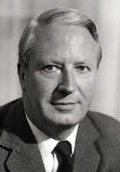Born in the family of a carpenter, who established a small building firm in Broadstairs, Kent; was educated at Chatham House College, Ramsgate, and King's School, Canterbury; studied at Balliol College, Oxford (1935-1939), graduating a second in philosophy, politics, and economics; while at university, he became active in politics and was elected President of the Oxford University Conservative Association (1937); served as Chairman of the Federation of University Conservative Associations (1937-1938) and President of the Oxford Union Society (1938-1939); was commissioned second lieutenant (1941) in the Royal Regiment of Artillery; promoted to lieutenant (temporary, 1942), captain (temporary, 1945), major (temporary, 1945), lieutenant-colonel (1947); served with anti-aircraft battery around Liverpool and in Europe; was employed as a civil servant in the Ministry of Civil Aviation; returned to Parliament as Conservative MP for Bexley (1950-1974), representing later Sidcup (1974-1983), and Old Bexley and Sidcup (1983-2001); appointed Lord Commissioner of the Treasury (7 Nov 1951 - 22 Oct 1959); governmental appointments under Winston Spencer-Churchill and Anthony Eden included Joint Deputy Government Chief Whip (1952-1953), Deputy Government Chief Whip (1953-1955), and Government Chief Whip (1955-1959); simultaneously took the office of Parliamentary Secretary to the Treasury (20 Dec 1955 - 14 Oct 1959); sworn in as a member of the UK Privy Council (22 Dec 1955); joined the Cabinet of Harold Macmillan as Minister of Labor (14 Oct 1959 - 27 Jul 1960); was appointed Lord Privy Seal (28 Jul 1960 - 21 Oct 1963) and spent much of the time between 1960 and 1963 trying to negotiate terms for UK to join the European Economic Community (EEC); served as Secretary of State for Industry, Trade and Regional Development and President of the Board of Trade (21 Oct 1963 - 19 Oct 1964) in the government of Sir Alec Douglas-Home; became the first Leader of the Conservative and Unionist Party (2 Aug 1965 - 4 Feb 1975) elected on secret ballot; retained his post despite the Conservative defeat in the 1966 General Election (31 Mar 1966: Labour 363, Conservatives and associates 253, Liberal 12, others 2); formed the government as Prime Minister and First Lord of the Treasury (19 Jun 1970 - 4 Mar 1974) after the Conservative Party won the General Election (18 Jun 1970: Conservative 330, Labour 287, Liberal 6, others 7); continuously pressed for British membership in the EEC and signed the Treaty of Accession, formally establishing Britain's membership of this organization (22 Jan 1972); succeeded in passing the necessary legislation for Britain to join the EEC; worked for increasing law and order to the nation, restricting immigration, promoting free trade and restricting the power of trade unions; faced economic deterioration, culminating in the 'three day week' during the winter of 1973-1974; failure at negotiations with striking miners and violence in Northern Ireland ('Bloody Sunday', 30 Jan 1972) led to calling a General Election, where the result was almost a dead heat between the two major parties (28 Feb 1974: Labour 301, Conservative 296, Liberal 14, Ulster Unionist 7, Scottish National Party 7, others 10); resigned (4 Mar 1974) after the Liberals refused to enter the coalition with the Conservatives; was defeated by the Labour under Harold Wilson in a further General Election in October 1974 and by Margaret Thatcher for the party leadership in 1975; served on the Independent Commission on International Development Issues (Brandt Commission, 1977-1980); was offered the post of Ambassador to the United States, but declined (1979); continued to serve as a backbench MP until retiring from Parliament in 2001. Biography source: [8][9] |

